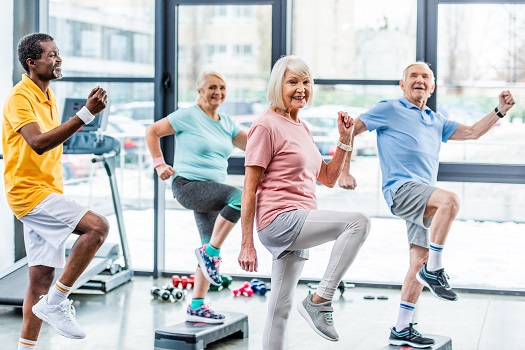
How long it takes to see results from working out depends on your goals and fitness level. For example, research has shown that people who are previously inactive usually see cardio and muscle gain within two to four weeks.
In contrast, it might take as long as four months to see significant fat loss.In the meantime, signs that you are getting fitter include feeling more rested, having an improved mood, and thinking more clearly.
Remember that the scale does not determine your fitness level. There are many other ways to gauge your progress. Read on to learn how long it takes to see results from working out and signs that you are getting fitter.
How Long It Takes To See Results
It might take as long as three to four months to see significant results in cardio, muscle, and weight loss, depending on your goals and how fit you are.
Cardio helps improve aerobic capacity, or the maximum amount of oxygen that’s available during exercise. The Centers for Disease Control and Prevention (CDC) advises 150 minutes of cardio per week, or 30 minutes per day, five days per week.
Resistance training can help build muscle mass and strength. You will likely make gains in strength more quickly than others if you are just starting out with exercise. The CDC advises resistance training two days per week.
Cardio and Muscle
A study published in 2018 reported that some people will see improvements in aerobic capacity and muscle gains in just two to four weeks.In contrast, researchers noted that your genetics, muscle fiber makeup, and the quality of your workouts affect your strength if you are well-conditioned. You might see improvements within eight to 12 weeks in that case.
Weight Loss
How long it takes to lose weight from working out depends on how often you exercise and your diet. You must burn more calories than you consume to lose weight.
Research has shown that doing more than the minimum recommended 150 minutes per week is essential for weight loss. A study published in 2017 found that exercise alone resulted in about 7% weight loss after about four months among overweight men and women. The participants performed seven to eight hours of endurance exercise weekly.
1. You Can Think Clearly
Physical activity helps support brain health and might prevent neurological diseases. Research has shown that many structural and chemical changes happen in the brain when you exercise. There’s an increase in the volume of gray matter in your brain increases when you exercise.Gray matter is tissue in your brain that helps control your emotions, memory, and movements.
With exercise also comes chemical changes that increase blood flow to your brain. Regular physical activity also allows for more glucose (sugar) to enter, helping improve cognitive function. Glucose is your brain’s primary source of energy. Increased energy helps improve your focus and memory and prevents cognitive decline with age.
2. You Feel More Rested
Research has shown that exercise generally helps you get a better night’s rest. There are mixed results regarding the type and timing of exercise. A review published in 2017 found that any type of exercise, from aerobic exercise to resistance training to tai chi and yoga, improves sleep quality.
Try using a sleep tracker device for a few weeks to measure your sleep quality. A sleep tracker can tell you how long it takes you to drift off and how long you spend in rapid-eye movement (REM) sleep. REM sleep is the deepest stage of sleep, which is necessary to feel well-rested.
Keep in mind that exercising too close to bedtime might keep you up at night. Try scheduling your workout so that you are done at least three hours before your bedtime.
3. You Feel Stronger
Aerobic exercise strengthens your heart and lungs. Look at your resting heart rate (RHR) and heart rate recovery (HRR) to tell if your heart and lungs are getting stronger. Your heart typically does not need to work as hard as rest, so a normal RHR is 60 to 100 beats per minute (bpm). Your HRR is your peak heart rate during exercise minus your heart rate after you cool down.
People in better cardiovascular condition have lower heart rates during exercise. Their heart rates come down more quickly to their RHR than others. As your heart gets stronger, it can pump more blood out with each contraction, meaning it does not have to beat as quickly.
4. Your Clothes Fit Differently
Your body shape may change due to losing fat and gaining muscle as your fitness improves. Focus on how your clothing feels instead of what the number says on the scale. Just keep in mind that clothing sizes often vary between brands.
Your pants may get looser in some areas, but you might fill them out in others. You might be losing fat in your abdominal area if your pants loosen up around your waist. Research has linked high amounts of abdominal fat have been correlated with higher disease risk.
In a study published in 2020, researchers found that exercise helps reduce both abdominal fat and waist circumference. The authors also noted that boosting either the amount or intensity of exercise can increase the amount of abdominal fat you burn.
5. Your Mood Improves
Research has shown that regular physical activity can result in improved mental health outcomes. In a review published in 2021, researchers found that exercise protects against anxiety and depression. For example, people with low or moderate fitness levels had a 47% and 23% greater risk of mental health concerns compared to highly fit people.
The authors noted that those benefits were dose-dependent, meaning they increased with more exercise. Both aerobic exercise and resistance training had positive impacts on mental health.
Tips for Using a Scale
The number on the scale is not worth fixating on, but that does not mean weighing yourself is a complete waste of time. Some evidence suggests that stepping on the scale every day helps keep you on track toward weight loss.
In contrast, using the scale daily can be a bit over the top for many people.15 A study published in 2015 found that women who frequently weigh themselves had lower self-esteem, increased concern about their weight, and higher rates of depression than others.
Here are some tips for using a scale in a healthy way:
- Consider the pros and cons: How does it make you feel when you step onto the scale? Frequently stepping on a scale may negatively affect mood and promote disordered eating behaviors and thoughts.Do not weigh yourself often if it compromises your mental health. Instead, focus on other aspects of your health.
- Know that the scale only tells part of the story: The scale does not show fat loss or muscle gains.Find other ways to gauge your progress, especially ones that make you feel good and motivate you.
- Only use it once per week: Any more than that can make you feel frustrated if you do not see any progress.




